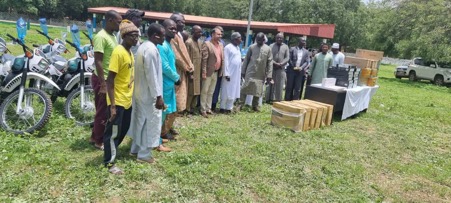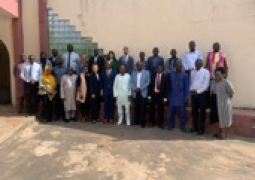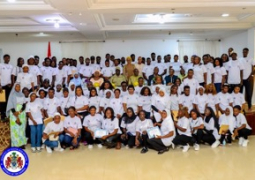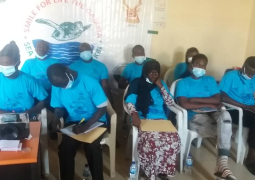
The surveillance equipment includes three pickups, 30 motorbikes, 15 laptops, 6 desktops and 100 tablet telephones. The vehicles and motorbikes are aimed at ending daily mobility constraints faced by these implementing partners.
It also seeks to help extension workers to embark on effective routine collection of data market, cattle tax collection, slaughter fees as well as manage livestock markets and facilities to ensure that national food quality and safety standards are maintained.
Representing the Minister of Agriculture, Mr. Abdoulie B. Touray, project coordinator at the Central Project Coordinating Unit (CPCU), expressed optimism that the support would now enable GLMA and DLS to effectively carry out their disease monitoring activities in a bid to to help the country attain her objective of reducing the Peste-Des-Petits- Ruminants Virus (PPR) incidence rate.
“As the project strives to reduce small ruminant disease especially PPR, it has also opened an Islamic Microfinance window to ease access to finance for small ruminant value chain actors.” he said.
He thanked the Gambia government and IsDB for funding the project, while assuring of the agric ministry’s continuous support to the project.
Mamud Njie, project director at SRPEP, reminded that in order to improve small ruminants rearing in the country, there should be reduction of prevalence and mortality caused by PPR, noting this disease has high morbidity and mortality rate in small ruminants in the country.
The equipment, he added, were procured to enhance the capacity of GLMA and DLS to monitor and control the disease. This, he added aims to reduce the mortality of PPR in sheep and goats by less than 10%.
He equally thanked IsDB and SRPEP’s task manager for their support and guidance in the project’s implementation.
For his part, Dr. Abdou Ceesay, director general for DLS said his institution has long been struggling with poor mobility for its extension staff, adding that this status and the high livestock farmers- livestock extension agent ratio have in many instances affected farmers’ access to livestock husbandry and veterinary services.
He, consequently noted the coming of those equipments would go a long way in enhancing the work of extension workers to ensure sustainable development for both the project and livestock producers.
“Effective implementation of disease control activities such as vaccination campaigns in our livestock production set up requires that potency of vaccines is well preserved until the time they are deliverable to the animals.”
This, he added, cannot be in the absence of proper mobility managements where cold chain can be effectively maintained.
Momodou Darboe, director general of GLMA, explained that the provision of those surveillance equipment to the agency would assist in their routine field visits to all 25 major markets and slaughter facilities across the country by field staff and management.
“It will also ensure our facilities are properly utilized and maintained to meet acceptable zoo-sanitary and national food safety standards at all times.”
DG Darboe commended SRPEP for their continuous support to GLMA, while assuring of judicious use of the resources.
About the project
SRPEP is a USD 26.81 million four-year project meant to contribute to the improvement of the livelihood of pastoral communities in The Gambia by strengthening the productivity and resilience of rural communities and stimulating business entrepreneurship in the livestock sector.
The project is funded by the Gambia government and Islamic Development Bank (IsDB); it covers the entire country. The objective is to enhance small ruminant development through herd health support mechanism; increasing productivity through genetics improvement and improved feed system; production and marketing management; innovation of product processing techniques and access to Islamic finance.





